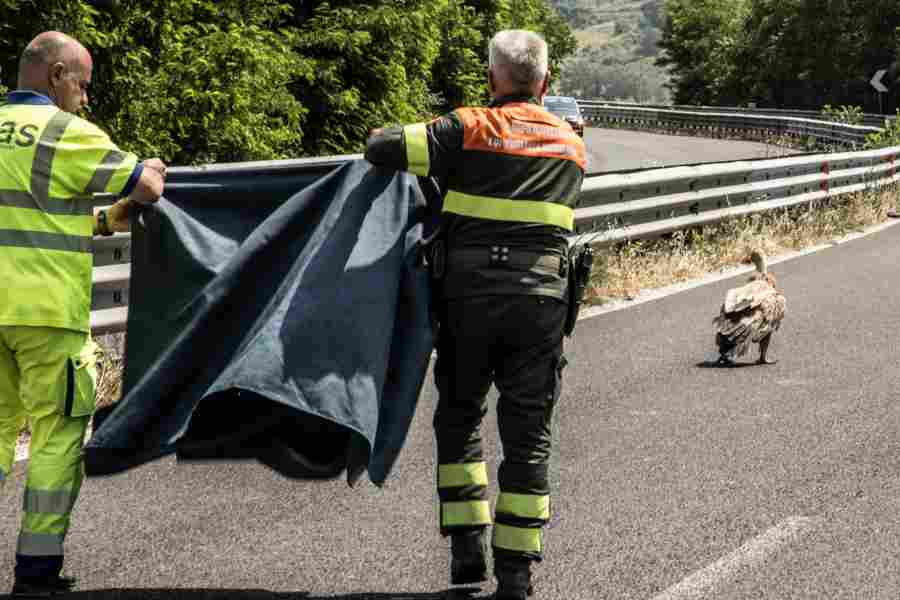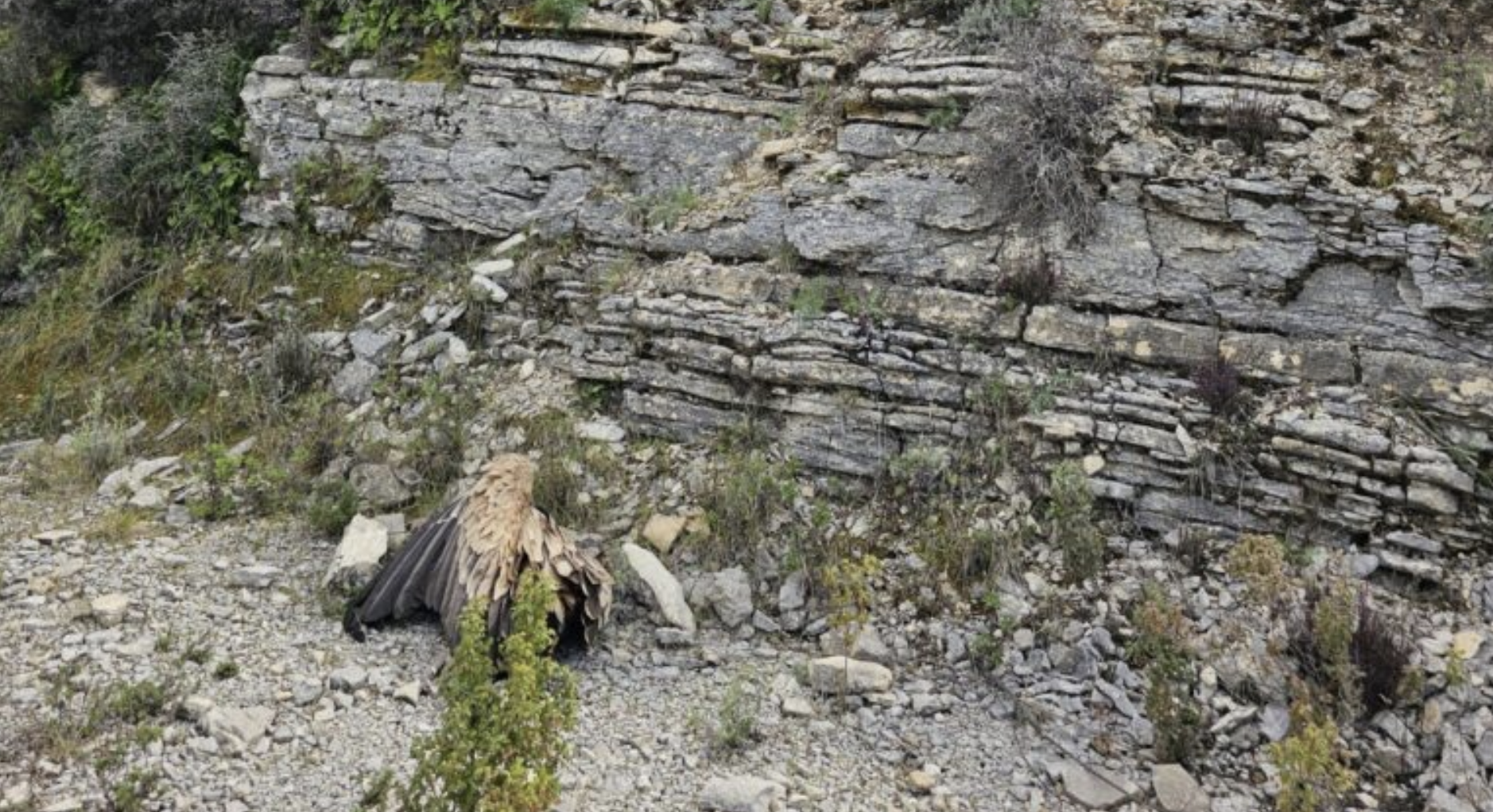
With the help of special nest cameras, all vulture lovers can watch the entire nesting and incubation process of three Griffon Vulture breeding pairs in the Negev Mountains of Israel!
This is all thanks to the coordinated efforts and collaboration among the Israel Nature and Parks Authority and the Israel Ornithological Center of the Society for the Protection of Nature in Israel.
Pair K74 and T49
Thefemale K74 and male T49 is a new pair for the Israeli Raptor Nest Cam project with a significant age gap between them – ‘love’ has no boundaries! The Male T49 hatched in 2013 in southern Israel and was marked the same year it hatched. In contrast, the female K74 is at least ten years older because she hatched in 2003 (the latest).
In this short video of the pair, you can see them bringing branches and carefully arranging them to construct their nest. You can also see the pair copulating on a couple of occasions. And then, on 29 December, K74 laid an egg as you can see at the video.
Last year, both pairs of Griffon Vultures filmed were incubating for about 53 days (plus or minus), so if this couple laid on 29 December, the chick is expected to hatch around 20 February, again more or less.
The pair have been taking care of their clutch for 29 days without any disturbance, but a couple of crows decided to break their peace. The unwanted visitors even tried to steal nesting material. The incubating vulture T49 did not particularly like this invasive presence and fought back, managing to banish one crow, but the other was brave and stubborn and not alarmed by the griffon’s threats. But eventually, the vultures’ efforts prevailed, and the crows left him in peace. https://www.facebook.com/plugins/video.php?href=https%3A%2F%2Fwww.facebook.com%2F1518871808419083%2Fvideos%2F208991120269733%2F&show_text=0&width=560
To learn more about the life of the pair K74 and T49, you can watch the live broadcast here.
Update 23/02/2020
On 23 February, after 56 days of incubation, the egg cracks began to appear through the nest cam early in the morning and then around 13:30, the chick hatched! The proud father T49 even did some nest cleaning and shortly fed the hatchling.
The mother K74 was away at the time and only reappeared 24 hours after the hatching. But, she immediately began working, protecting the chick and feeding it.
Video
24/02/2020
Have you ever since a day old Griffon Vulture chick? The day after hatching, the little chick can be clearly seen on camera! https://www.facebook.com/plugins/video.php?href=https%3A%2F%2Fwww.facebook.com%2F1518871808419083%2Fvideos%2F2531110990442516%2F&show_text=0&width=560
Update 15/03/2020
The little Griffon Vulture chick turned 21 days old and looks strong and healthy after a storm that hit the south of the country during the last weekend. Its parents are very devoted, shielding and protecting the chick continually, and of course, feeding it. With the nest cams, our colleagues in Israel monitor the chick every day and can see it gaining weight slowly slowly.https://www.facebook.com/plugins/video.php?href=https%3A%2F%2Fwww.facebook.com%2F1518871808419083%2Fvideos%2F2542857942655303%2F&show_text=0&width=560
Update 07/04/2020
On 6 April 2020, the chick spent 7 minutes alone for the first time since it hatched 44 days ago. Ever since it hatched, the chick has never been left unattended by one of its parents! Not even for a second!https://www.facebook.com/plugins/video.php?href=https%3A%2F%2Fwww.facebook.com%2F1518871808419083%2Fvideos%2F526892404614549%2F&show_text=0&width=560
Update 14/04/2020
The mother returns to the nest with a bloody neck, it seems she enjoyed a nice meal! Here the Griffon Vulture chick is 51 days old and its feathers are starting to grow.https://www.facebook.com/plugins/video.php?href=https%3A%2F%2Fwww.facebook.com%2F1518871808419083%2Fvideos%2F652015022245397%2F&show_text=0&width=560
Update 25/04/2020
On Thursday 24 April, there was an impressive sandstorm in the South of the country turned, and as you can see, the screen turned yellow. The chick is 62 days old and starts to wear its feathers with glory. Its parents still look after the chick non stop. Sometimes they are five meters away from the nest and it looks like the chick is alone, but it’s not! https://www.facebook.com/plugins/video.php?href=https%3A%2F%2Fwww.facebook.com%2F1518871808419083%2Fvideos%2F256505562063680%2F&show_text=0&width=560
Update 03/05/2020
The Griffon Vulture chick was alone, and neighbouring Griffon Vultures attacked it. When the chick was small and defenceless, its parents guarded it continuously to ensure its safety. Now the chick is 70 days old, and it can cope better with the sun and the wind on its own. It also demands more food as it is quickly growing, which means that its parents need to supply greater quantities, therefore both its parents leave the nest to search for food. But, once it is alone, it might be attacked by foreign Griffon Vultures, just like in this case. This time it was attacked by T38 (hatched in 2016) and K53 (the oldest male from the nearest nest that failed to breed this year). Usually, these attacks commonly occur by vultures that have failed to breed or that have not yet established active nesting.https://www.facebook.com/plugins/video.php?href=https%3A%2F%2Fwww.facebook.com%2F1518871808419083%2Fvideos%2F245906526651643%2F&show_text=0&width=560
Update 17/05/2020
The chicks is now 84 days old — how time flies. Now it is left alone, for the most part of the day time and even at night. In the day, its parents go out to look for food for the chick and they then sleep on the cliffs opposite the nest.
Video
Update 26/05/2020
The Griffon Vulture chick had a surprise visitor — an Egyptian Vulture from a nearby nest that came to eat some of the leftover food. The chick allowed the intruder to enjoy some of the leftovers in the nest, but the hospitality was short-lived, as in the end, the chick stood its ground, and the Egyptian Vulture eventually left.https://www.facebook.com/plugins/video.php?href=https%3A%2F%2Fwww.facebook.com%2F1518871808419083%2Fvideos%2F575820170003902%2F&show_text=0&width=560
Pair K72 and K53
The well-known and beloved pair K72 and K53 that was broadcast successfully rearing a chick last season (2019) built an impressive new nest!
The former pair of Griffon Vultures showed up in front of the nest cameras at the end of November. They did not waste a single second and very quickly began their courtship and nesting. The frequent matings started in early December, and towards 10 December 2019, they quickly started to build a new (and quite large) nest with an astonishing determination, until they laid an egg on it on the morning of 29 December.https://www.facebook.com/plugins/video.php?href=https%3A%2F%2Fwww.facebook.com%2F1518871808419083%2Fvideos%2F591654554956360%2F&show_text=0&width=560
Incidentally, the laying occurred about 12 hours before the laying of the new couple K74 and T49.
To learn more about the life of pair K72 and K53, you can watch the live broadcast here.
Pair K70 and T99
The nest is the same nest that was broadcasted last year, and the couple that occupied it this year is the same couple that managed to breed a chick live during the previous season.
Like the other pairs, these old pair appeared in front of the cameras at the end of November but did not show signs of breeding behaviour immediately. They started the courtship, mating and nest building only toward the end of December.
Then, in the evening hours of 19 January 2020, or early morning hours of 20 January, they laid their only egg.https://www.facebook.com/plugins/video.php?href=https%3A%2F%2Fwww.facebook.com%2F1518871808419083%2Fvideos%2F1435264116647935%2F&show_text=0&width=560
Update 16/06/20
Unfortunately, on 4 June 2020, the Griffon mother collided with a powerline and died two hours following the incident. Now, the Griffon Vulture dad remains alone to tend to the chick. Conservationists are monitoring the situation to see if the chick is getting enough food in order to intervene if necessary.https://www.facebook.com/plugins/video.php?href=https%3A%2F%2Fwww.facebook.com%2F1518871808419083%2Fvideos%2F743809699756827%2F&show_text=0&width=560
Update 27/06/2020
Conservationists in Israel found a solution! They will deliver food with a military drone to make sure the chick grows strong and healthy. https://www.facebook.com/plugins/video.php?href=https%3A%2F%2Fwww.facebook.com%2F1518871808419083%2Fvideos%2F273385777207548%2F&show_text=0&width=560
Update 26/07/2020
After many months of following the evolution of the little chick, it finally fledged on 26 July 2020. Well done to everyone involved in saving the chick following the death of its mother. We hope the vulture survives for a long time in the wild! https://www.facebook.com/plugins/video.php?href=https%3A%2F%2Fwww.facebook.com%2F1518871808419083%2Fvideos%2F643520446265483%2F&show_text=0&width=560
To learn more about the life of pair K70 and T99, you can watch the live broadcast here.
So, this year, it seems that viewers will be able to watch live broadcasts from the nests of three Griffon Vulture breeding pairs in Israel! Let’s hope that all three pairs will succeed in breeding healthy chicks that will strengthen the Griffon Vulture population in Israel.
Griffon Vultures in Israel

Sadly Israel’s Griffon Vulture population is in trouble. In the past 50 years, the numbers of Griffon Vultures in Israel is steadily declining. Until the late 1950’s hundreds of pairs of Griffon Vultures bred all over the country from the extreme north to the Eilat Mountains. In the early 2000’s only around 120 pairs bred and today less than 60 pairs remain. Today the majestic Griffon Vulture is critically endangered (CR) in Israel and other places around the eastern Mediterranean. This is drastic decrease is a result of similar poisoning incidents, usually caused by farmers to protect their livestock from predators. The latest mass poisoning occurred in May 2019, killing eight vultures and nearly wiping out their population in Golan Heights. The worst instance of poisoning took place in 1998 when about 40 vultures were found dead after eating the carcasses of poisoned cattle or wild animals.
In efforts to reverse the decline wildlife organisations in Israel have been carrying out projects to boost the local population include transporting and releasing birds from Spain where the Griffon Vulture population is increasing. However, this recent incident will severely damage those efforts, and Griffon Vulture is dangerously close to becoming extinct in Israel.
Sign up to our newsletter and never miss any vultures news!




